Vegetarian Diet for Weight Loss: Meal Plan and Food List
So you want to know whether it’s possible to lose weight on a vegetarian diet? Well, you’ve come to the right place!
Get your 7-Day Vegetarian Weight Loss Meal Plan – Free to Download!
You can download the free 7-Day Vegetarian Weight Loss Meal Plan PDF by using the form below. The package includes all recipes, a grocery list, and a well-organized meal plan overview.
But we’d advise you to read on we’re going to explain some key information about vegetarianism and weight loss, which is worth checking out so you can go in prepared!
Subscribe to get our FREE 7-Day Vegetarian High Protein Meal Plan for Weight Loss
Jump to
Full breakdown: 7 days of the Vegetarian Meal Plan for Weight Loss
Our meal plan offers a filling breakfast followed by an easily packable lunch and a comforting dinner.
We make sure to provide generous portion sizes and a variety of types of food that will satisfy you, meet your nutritional requirements and allow you to lose weight at a steady, sustainable pace!
The recipes (access them all below!) were developed by us specifically to be suitable for weight loss, and each recipe is a tried and tested favorite, guaranteed to work every time.
Complete Adapatabilty
We’ve created this vegetarian weight loss meal plan to work for the general population. But of course, you should take your personal needs into account and adapt accordingly!
You can swap out any recipes you don’t like very easily for another breakfast, lunch or dinner from the plan.
Day 1
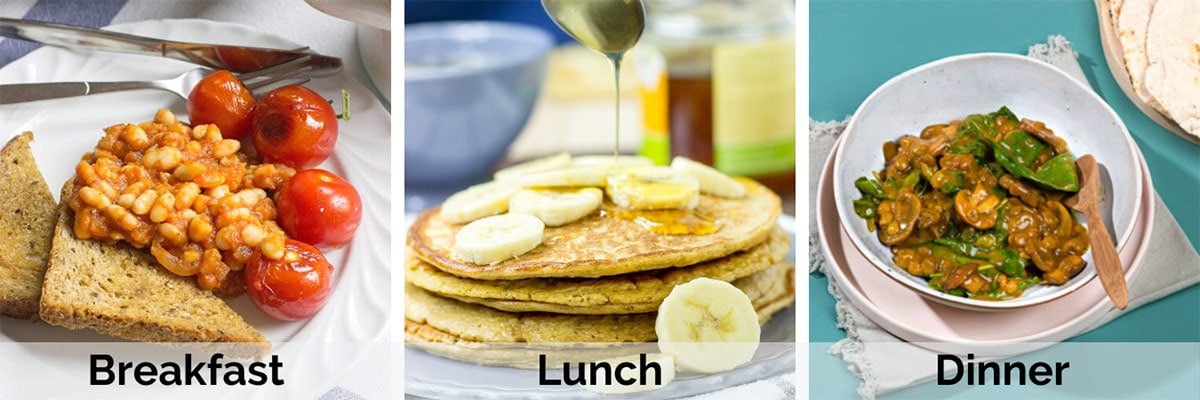
Here’s the first day of the vegetarian weight loss meal plan. We kick things off with:
Breakfast
Lunch
Dinner
Small snacks:
Protein Shake (120kcal, 23g protein)
Fruit of Choice (100kcal, 1g protein)
Daily total:
Main Meals: 1238 kcal, 69g protein
Snacks: 220 kcal, 24g protein
= 1458 kcal, 93g protein
Day 2
We follow the “cook once, eat twice” approach. This involves preparing two servings of each meal – one to eat right away and the second serving for the next day. Therefore, today’s meal consists of the leftovers from yesterday.
Day 3

Breakfast
Lunch
Dinner
Small snacks:
Protein Shake (120kcal, 23g protein)
Fruit of Choice (100kcal, 1g protein)
Daily total:
Main Meals: 1260 kcal, 60g protein
Snacks: 220 kcal, 24g protein
= 1480 kcal, 84g protein
Day 4
Just like in day 2, have the leftovers from the previous day. No cooking necessary 🙂
Day 5

Breakfast
Lunch
Dinner
Small snacks:
Protein Shake (120kcal, 23g protein)
Fruit of Choice (100kcal, 1g protein)
Daily total:
Main Meals: 1263 kcal, 61g protein
Snacks: 220 kcal, 24g protein
= 1483 kcal, 85g protein
Day 6
Similar to Day 2 and 4, enjoy the leftovers from the dishes prepared on the previous day.
Day 7
Day 7 is all up to you. It’s a great day for leftovers, or if you want to go out to eat. We still recommend keeping the calories to about 1300kcal for the main meals if weight loss is a priority.
These are our favorite leftover recipe ideas:
Breakfast
Lunch
Dinner
Small snacks:
Protein Shake (120kcal, 23g protein)
Fruit of Choice (100kcal, 1g protein)
Daily total:
Main Meals: 1308 kcal, 67g protein
Snacks: 220 kcal, 24g protein
= 1528 kcal, 91g protein
Since you’re supposed to add in your leftovers into the recipes, our calorie and protein calculations here will naturally differ from yours for this ‘Leftovers Day’.
A few notes on how we’ve structured the meal plan:
- We’ve used easy recipes only to keep kitchen time as short as possible.
- You’ll find the more perishable ingredients earlier in the week (eg. leafy greens) and the sturdier veggies later in the week (eg. zucchini, carrots).
- That allows you to make one single grocery haul for the entire week.
- We focus on a balanced diet. This means we keep an eye on how much bread, legumes, eggs, dairy and starchy vegetables you’ll get per day.
Different types of vegetarian diets
The uniting factor in all vegetarian and vegan diets is not eating meat or fish. This is often for ethical reasons such as animal cruelty or the environmental impact of the meat industry. It can also be for religious reasons.
There are a few different versions of a vegetarian diet.
- Lacto-vegetarians exclude meat, fish and eggs, but will eat milk, cheese and other dairy products.
- The ovo-vegetarian diet excludes all animal products except for eggs. So milk and cheese is a no-go along with meat and fish.
- The lacto-ovo vegetarian diet just excludes meat and fish. All dairy products and eggs are allowed. Most people considered vegetarians follow the lacto-ovo diet. Our weight loss meal plan definition of vegetarianism too.
- The vegan diet excludes all animal foods including all dairy. We have a separate vegan meal plan here!
- Even more intense is the plant-based diet, a branch of veganism that also excludes all processed foods and only allows plant-based foods like legumes, vegetables and grains.
What are the health benefits of a vegetarian diet?
There are many health benefits to a vegetarian diet, though, as with any diet, it needs to contain the proper balance of nutrients in order to be healthy.
Heart health
Vegetarians consume lower amounts of animal fat and dietary cholesterol compared to people who include meat in their diet.
Furthermore studies have shown that a vegetarian diet lowers the risk of high blood pressure.
This means a vegetarian diet is naturally a healthier alternative for people with heart disease. Studies agree that adopting a more plant-based diet decreases deaths related to heart disease.
Prevent diabetes
A balanced vegetarian diet can help regulate your blood sugar and prevent diabetes, thanks to the focus on fibrous veggies and pulses.
Healthy skin
There is also evidence that being vegetarian can help with skin health, again because you are more likely to be eating vitamin and mineral rich plant foods.
Read about all this in more detail in this article on the benefits of a vegetarian diet.
Obviously, all of this depends on you making healthy choices as a vegetarian – if you live on bread and cheese, you are unlikely to get the health benefits vegetarianism could offer!
That being said, the vegetarian diet can also be advantageous for a different key health factor: weight loss.
The weight Loss basics
There is a simple reason for weight gain; if you are eating more calories than you are burning you will put on weight!
Of course, the reasons why you might not be burning enough calories can be more complex.
Perhaps you aren’t doing enough physical activity, or you are eating more because of stress. Maybe you are getting older and your metabolism is naturally slowing down, or maybe you are consuming a lot of empty calories, like alcohol.
Only you can identify why you are gaining weight and whether or not it is an issue that needs to be addressed.
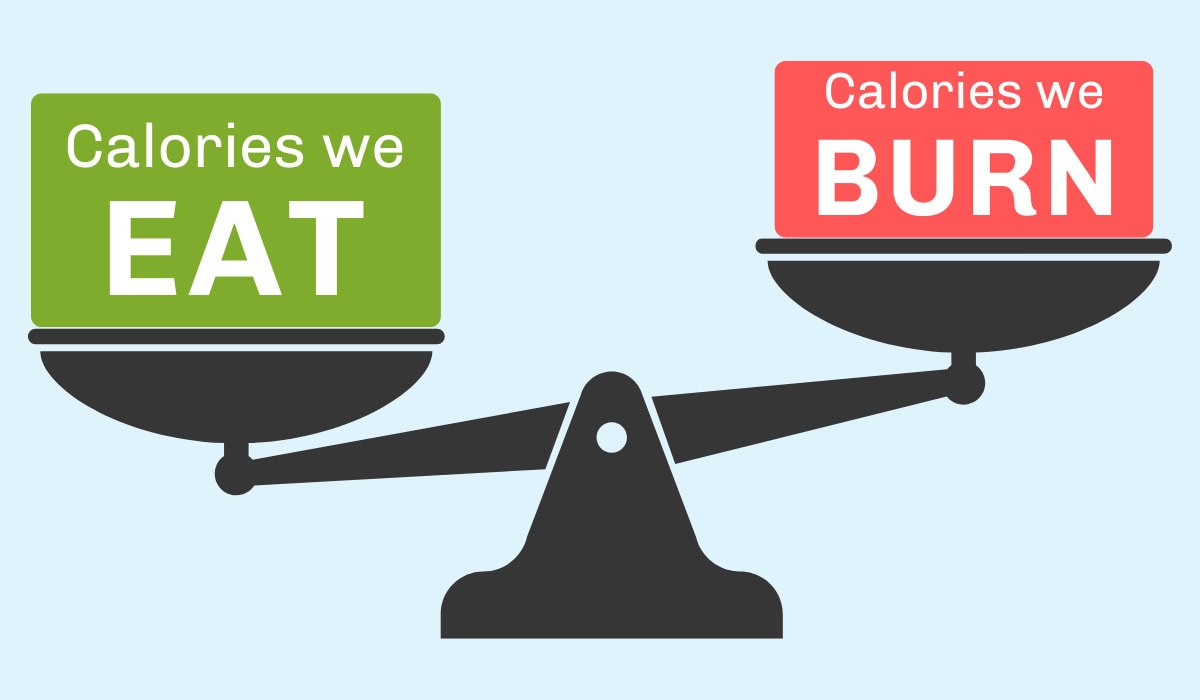
For an active female you need to eat about 1,500 calories a day to lose weight, although this number might be less or occasionally more depending on your activity levels and age and starting weight.
As an active man you need about 1,800 calories a day to lose weight. Same goes with activity levels and age.
Below is a rough guide as to how much of each macro men and women need per day for weight loss:

Here is a bit more help on how to work out your calorie needs for weight loss.
So that part is simple. The difficult part is actually doing it. Staying full, staying satisfied, staying energized without feeling cranky can seem almost impossible to achieve.
The best tips to lose weight on a vegetarian diet
There are the essential vegetarian-specific tips to make weight loss easier for you.
Get enough protein
The first and most important piece of advice I can give you is to eat enough protein! Protein can be hard to get enough of as a veggie, but it is crucial for general health and specifically for weight loss.
The minimum amount of protein is around 45g per day for a woman and 55g per day for a man. This is the minimum amount of protein required to stop a protein deficiency, but we know that more than that can be helpful – for multiple reasons.
60-100g protein per day (for the average female) is a great amount for weight loss. This is because protein is the most filling macro with proven weight loss benefits; it literally suppresses production of the hunger hormone ghrelin.
If you are lacking protein, you are going to feel a lot hungrier throughout the day and be more likely to snack between meals.
Not only that but protein contributes to muscle mass and maintenance. This can help with weight loss because it means our body is more metabolically active.
The more muscle we have, the more calories our body needs a day. So in terms of weight loss? It makes weight loss ‘easier’ if you have more muscle!
If you really want to focus in on protein, check out our high protein veggie meal plan!
Our top tips regarding protein intake:
- Space your protein intake out evenly over the day! Don’t just have a protein heavy lunch or dinner!
- Try to eat different sources of protein in each meal (eg. breakfast: Greek yogurt, lunch: scrambled eggs, dinner: black bean soup)
- Aim for between 60-100 grams of protein per day*
*Vegetarian Protein: An Honest Note
It’s not always easy to get lots of protein as a vegetarian. 60-100g of protein per day is more difficult without the use of protein shakes or repetitively eating the same food. This is especially true while trying to lose weight.
Vegetarians have to try a bit harder than omnivores to find a balance between optimum protein amounts and interesting, diverse meals.
You definitely still CAN lose weight with less than 60g protein per day, it’s just not 100% ideal.
So, if you want to get beyond 60g of protein on a low calorie plan (eg. 1300kcal/day), what are your choices?
- Use protein shakes or other low calorie high protein snacks. That allows you to still get to eat varied meals.
- You double down on vegetarian low calorie high protein sources. Think plant-based protein products like tofu, seitan and low fat dairy-based products like cottage cheese, Greek yogurt as well as eggs. That way you could avoid protein shakes, but have much less varied meals.
Or you could stick to a varied diet and skip the protein shake. You’d accept that it just might not be ‘gold standard’ regarding protein intake, but you can still lose weight healthily.
Have a look at the picture below to help guide you with some vegetarian sources of protein!
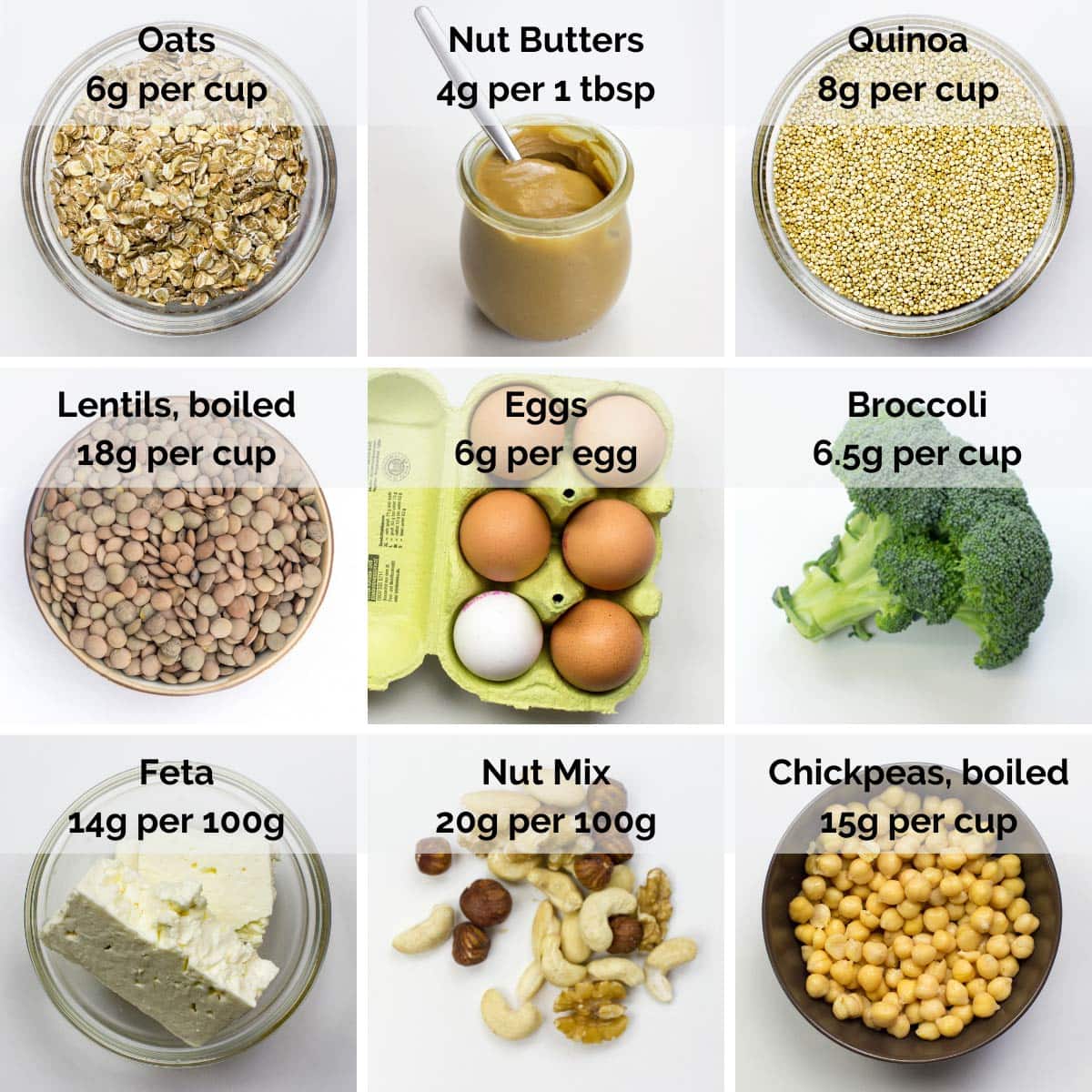
Eat dietary fiber
My next piece of advice would be to eat plenty of fiber. It’s is another fantastic tool when it comes to losing weight (and for our health!). Technically fiber is a type of carbohydrate. What differentiates fiber to other carbs is that the body can’t digest it.
Fiber is also extremely filling and most high fiber foods (such as vegetables) have low calorie density – meaning you can feel full for less calories.
Our top tips for fiber:
- 10 grams of fiber per meal.
- 30-40 grams of fiber per day. By switching to some whole grain products and including legumes to your diet you should get there effortlessly (think brown rice, black beans, avocado).
- If you find you produce a lot of gas when you increase your fiber intake then don’t worry! This is normal. Reduce the amount of fiber and then build up again and you should find this settles.
Eat healthy carbs!
Carbs get a bit of a bad reputation sometimes. But, carbohydrates for weight loss are actually brilliant – you’ve just got to pick the right ones!
Wholegrain carbohydrates contain healthy nutrients like iron and calcium, and contain lots of fiber and protein so actually help us to feel full.
Fruits and vegetables also come under the ‘carbohydrate’ bracket, and we definitely don’t want to remove them!
Starchy vegetables like potatoes contain more calories than non starchy vegetables like carrots or peppers.
These non starchy vegetables are brilliant pairings to main dishes or as a snack with hummus because they help to make the dish feel more complete and filling but don’t add in lots of calories.
We’ve also compiled a list of the best fruits for weight loss too, and you can give that a read for some more motivation!
Top tips for carbohydrates:
- If you haven’t really eaten whole grain carbohydrates before then you can start by using 50% whole grains, 50% white. This works great for partners or families too!
- Don’t ditch the starchy carbs, they’re great for us!
- Non starchy carbs are great additions to any meal or snack for helping to feel full.
- Fresh fruits are better than dried fruits: much more “volume” for the same amount of calories
Try out low fat dairy products (and low fat coconut milk)
An ever-popular question… Should you eat high or low fat dairy foods for weight loss? My opinion is that eating low fat milk products the majority of the time is helpful for vegetarian weight loss.
The reason here is quite simple and straightforward: it’s all about the numbers.
1 gram of fat contains 9 calories. 1 gram of carbohydrates or protein contains 4 calories. Fat doesn’t help with feeling full, but protein and carbohydrates (which usually contain fiber) do help.
So by eating lower fat products you can either eat more total food for the same amount of calories, or eat the same total volume of food for less calories. And you eat more of the satisfying foods.
Seems like a no brainer really, doesn’t it?
This is even more important for vegetarians, because this is essentially the vegetarian version of ‘lean meats’.
Meat eaters do have it a little bit easier when it comes to protein intake because they could eat a low fat piece of meat and get a lot of protein and no added calories as fat or carbohydrates.
The concept here is similar – eat lower fat dairy products and get more protein… Who needs lean meat when you’ve got low fat dairy at your side!
I personally used to really dislike low-fat dairy and found it very bland. However, when cooked correctly and used in the right flavour combinations it can be just as tasty as the regular stuff! You just have to know how to use it properly.
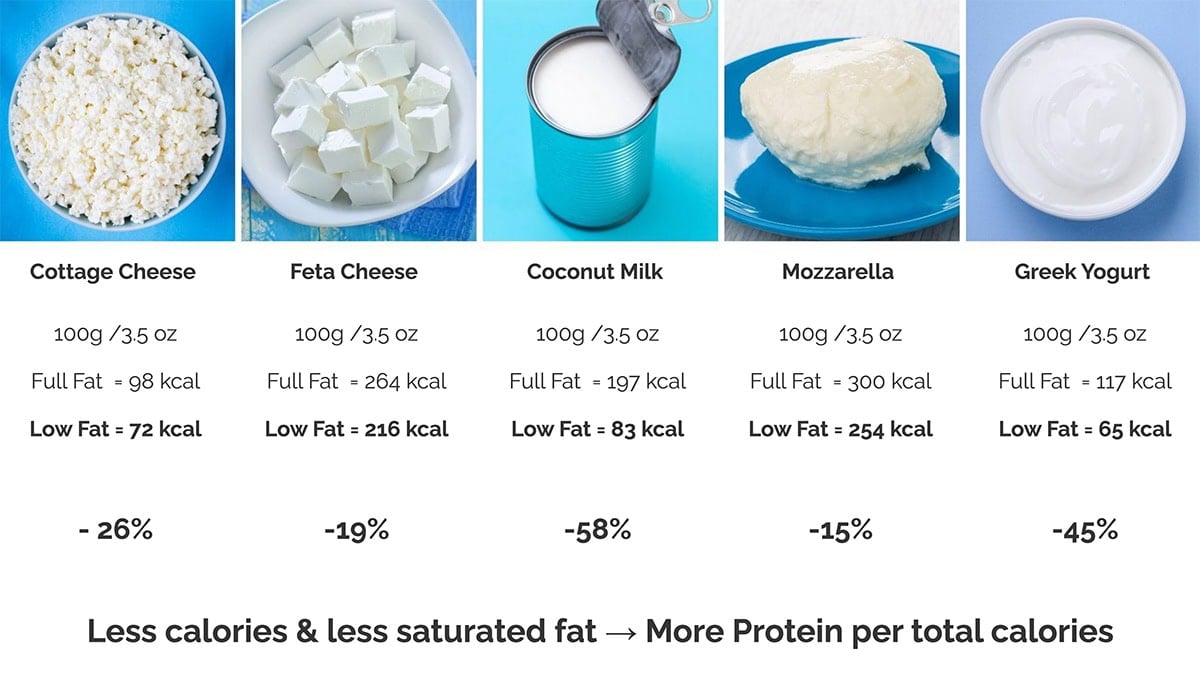
Our low fat dairy (and coconut) tips:
- Try some of the swaps out from above. Our favorite, and arguably the most useful, is using low fat Greek yogurt and combining it with something like blueberries or strawberries.
- Don’t worry about ‘losing flavour’! With the right recipe or pairings this shouldn’t be the case. For example, why don’t you try low fat coconut milk in our chickpea curry or low fat mozzarella in these skillet pizza pancakes?
Vegetarian foods that are good for weight loss
So what foods are good to include in your vegetarian weight loss diet? It is best to focus on foods that are high protein, high fiber and low fat.
Let me talk you through some of the options available to you that meet those requirements.
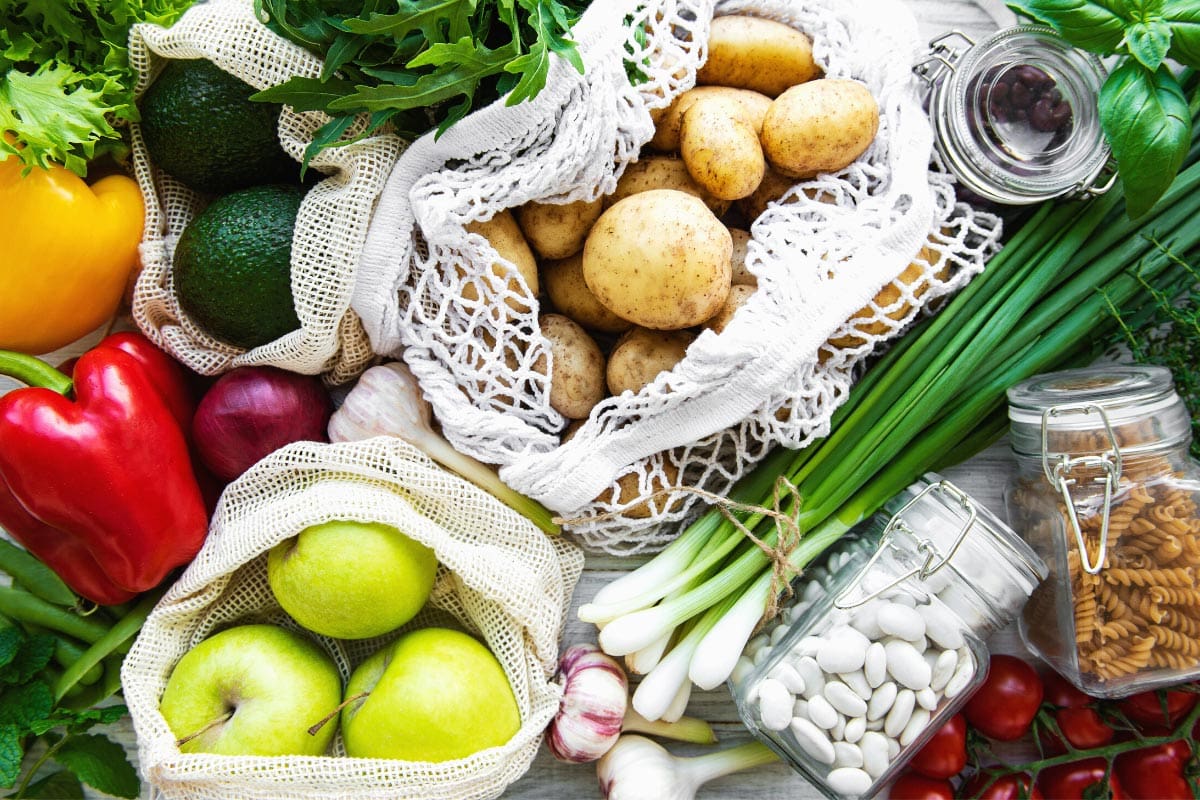
As mentioned above – Low-fat dairy
Dairy products are a good source of protein for vegetarians. I would recommend going for the low-fat option whenever possible to save a few calories and reduce your saturated fat intake.
Some good options are cottage cheese, mozzarella, Greek yogurt, natural yogurt, milk
Try the low fat Greek yogurt and raspberry compote for breakfast, or a sumptuous sweet potato salad with feta for dinner.
Legumes
Beans, chickpeas, lentils: all these are great sources of both lean protein and fiber, generally nutritious all rounders.
The only thing you might find is that all that fiber can cause some, ahem, flatulence, that is somewhat embarrassing/uncomfortable. Stick to one cup or so a day and you should be fine!
Try our delicious lentil tabbouleh or mouthwatering chickpea salad sandwich.
Leafy greens and vegetables
Leafy greens and veggies are of course indispensable in a weight loss diet. You should be having a handful at least twice a day.
Some popular options are spinach, Swiss chard, broccoli, asparagus, bell pepper, carrots, mushrooms, cucumber, aubergine, zucchini, cauliflower and tomatoes.
They contain many vitamins and minerals for general wellbeing, are super fibrous and low calorie, which helps with your weight loss goals. Some veggies, like broccoli, even contain a decent amount of protein.
Frozen veg (and fruit) is a great way to make sure you always have some to hand. Freezing them helps retain lots of nutrients, so it’s actually just as healthy as fresh veg. Why not keep a couple of packets of frozen berries and mixed vegetables in the freezer?
Try this spinach and banana smoothie or our broccoli and halloumi traybake.
Fruits
Various fruits have different levels of sugar and fiber. When trying to lose weight, it can be smart to choose fruits that are higher in fiber and lower in sugar.
Some good examples are: orange, melon, berries, apple, grapefruit, papaya, kiwi, plums, peaches, nectarines and pineapple.
An appropriate serving size while losing weight would be one handheld fruit, such as an apple or peach, or two plums, along with one cup of sliced melons or berries.
Whole grain carbs and starchy vegetables
Many people worry about consuming bread, pasta, potatoes or rice while trying to lose weight, as there are lots of people who advocate against it. However, we know from current research that both high and low carbohydrate diets are useful for weight loss. That is, it’s more important to follow a diet which you can sustain for the long term and enjoy.
Oats, brown rice and grains like buckwheat and amaranth, as well as starchy vegetables like sweet potatoes, are some of the best weight loss friendly carbs.
Try this cherry oatmeal or spring vegetable fried rice.
Eggs
If you’re following a vegetarian diet that allows eggs, then definitely incorporate these into your weight loss diet.
Eggs are a great source of protein and super versatile; hard-boiled eggs, scrambled eggs, poached eggs..all delicious!
They are also fairly low calorie, at around 70 kcal per egg.
Try this egg and asparagus breakfast or our favorite baked eggs recipe.
Nuts and seeds
Nuts and seeds are rich in healthy fats, protein, and fiber. However, they also contain a high amount of calories. Therefore, it is recommended to consume them in moderation, such as around 30 grams or 1 ounce per day, especially during your weight loss efforts.
Good options are pumpkin seeds, chia seeds, sunflower seeds, almonds, hazelnuts and walnuts.
Vegetarian foods to avoid when losing weight
You’ve got an idea of what foods/macros will help you to lose weight, now let’s look at what you should be avoiding. The thing that unites these foods is that they are very calorific with little nutritional value.
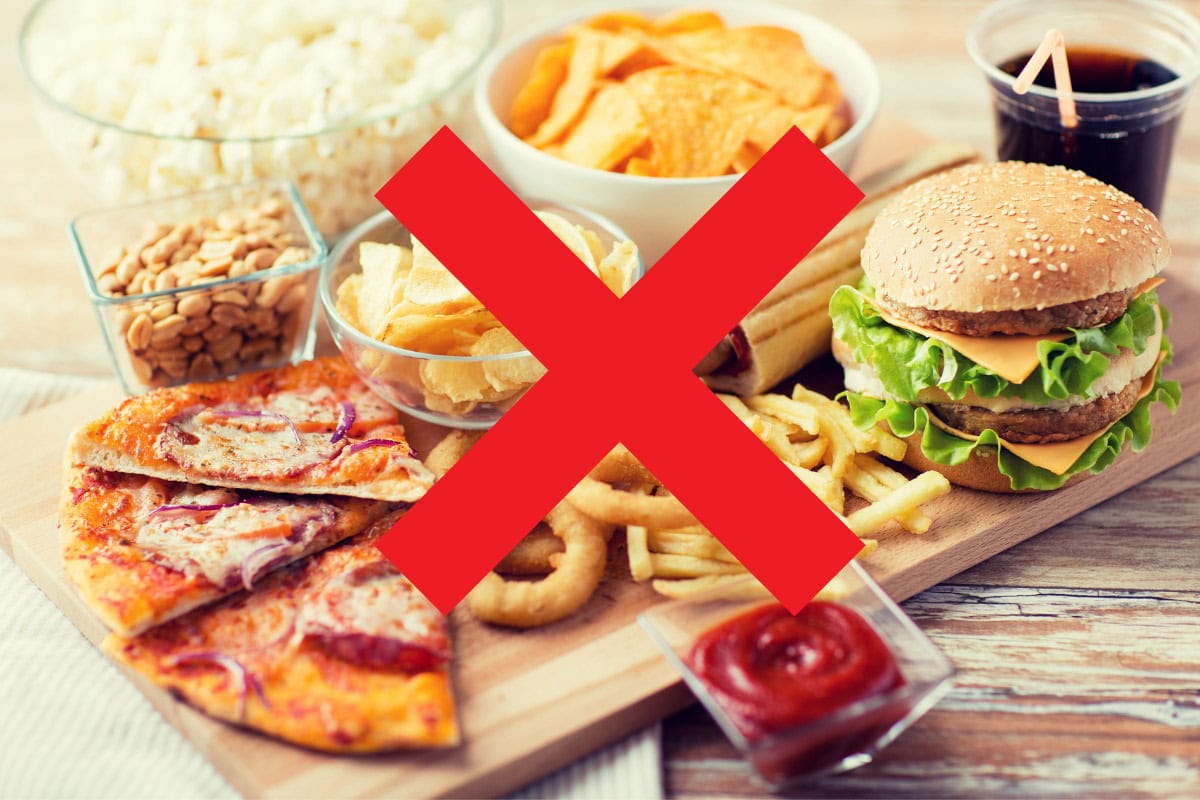
Fats
Avoid highly processed fats like margarine and cheap oils like canola or sunflower oils. Fats themselves aren’t bad, but you need to stick to unprocessed, unsaturated fats like olive oil and avocado.
Meat
Stop purchasing meats of all kind, especially the highly processed ones like sausages and sandwich slices. Otherwise this won’t be a vegetarian diet!
Snacks
Snacks aren’t inherently bad, and you don’t have to avoid them. However, avoid stocking up on sugary snacks like donuts, milk chocolate, cookies and sweets. Also skip the potato chips and salted nuts if possible. Try filling snacks like low fat greek yogurt and berries or a fruit and vegetable-based smoothie.
Dressings and sauces
Walk past heavy caloric products like mayonnaise, ketchup, french dressings and alike.
Drinks
Store bought sodas and iced teas usually are high in calories. Fruit juices are naturally high in calories too. Cut down on these products.
Also important: read nutrition labels!
You’d be surprised how many calories you find in a single bottle of soda or in a cup of seemingly healthy fruit yogurts. Make sure to always check the serving sizes as well.
Many companies are sneaky and recommend super small serving sizes in order to bring the calorie count down.
Life after the meal plan!
Your weight loss journey probably won’t end after 7 days of healthy vegetarian recipes. We’re confident many of the recipes can become staples in your household. Then it’s about sticking to them and adding more to the mix!
We’ve got hundreds of recipes online already. Just use the search on our main hurrythefoodup page. It should be easy to find your next favourite!
We also run a dedicated weight loss course called The Vegetarian Protein Fix.
Subscribe to get our FREE 7-Day Vegetarian High Protein Meal Plan for Weight Loss
Frequently asked questions
How many people is the meal plan for?
The meal plan is laid out just for one single person. Also the recipes only call for ingredients to make only one or two servings. If you want to use the recipes of this meal plan for your partner or whole family you’ll have to multiply the ingredients. Each recipe card can be scaled up at the click of a button.
How do vegetarians lose weight fast?
Unfortunately, to lose weight fast as a vegetarian you will have to follow a diet which is significantly restrictive in calories. We do not recommend this, because it usually leads to poor adherence over the long term.
There is no hack to the system! You just need to eat well and burn slightly more than you eat! To reach your weight loss goals healthily our recommendation for most people is 0.5-1.0kg of weight loss per week.
Are there different meal plans for men and women?
The meal plan is set to 1300kcal/day just with the main meals. By enabling up to 3 snacks you can make the meal plan suitable for females and males. You can calculate your individual calorie intake here.
Alternatively you can always vary the calories of a meal by adding or removing certain ingredients (bread, avocado, etc.) to adjust to your individual level.
What can a vegetarian eat to lose belly fat?
There is no secret recipe or ingredient to losing belly fat, and you cannot choose where you lose fat from. However, high protein, high fiber, low fat meals are the best things to eat for a vegetarian to lose belly fat.
This is because meals with this balance of macros will keep you fullest for longest, making you more likely to maintain a calorie deficit over the long term – which is the most important thing!
Is a vegetarian diet good for weight loss?
Yes, a vegetarian diet can be good for weight loss. There are plenty of healthy, filling vegetarian foods with a relatively low calorie count that make great additions to a weight loss diet.
Furthermore, a focus on fruits, vegetables and alternative sources of protein usually mean you will consume more fibre, protein and micronutrients. However, the key to weight loss is simply burning more calories than you consume. Any healthy diet will do the trick for this, meat or no meat.
Before you go, give this meal plan recipe a test!
If you’d like to try out a recipe from the meal plan right away, how about these delicious Baked Sweet Potatoes with a Five-Star Salad?

Equipment
Ingredients
Baked potatoes
- 2 sweet potato (roughly 250g/9oz each)
- 1 tsp olive oil
- Salt to taste
Salad topping
- 5 oz low fat feta cheese
- 1 handful olives
- 12 cherry tomatoes
- ⅓ cucumber (for extra crunch)
- 1 small red onion (or 3 spring onions)
- ½ lemon, juiced
- 1 clove garlic (peeled and diced)
- 1 handful basil, fresh (dried is ok as well, but use less)
- ½ tsp cumin, ground
- ½ tsp cayenne pepper
- ¼ tsp black pepper (freshly ground)
- 1 tsp olive oil
Instructions
Baked potatoes
- Preheat the oven to 200°C (400°F).
- Wash the potatoes and rub a coat of olive oil and salt on the skin.2 sweet potato, 1 tsp olive oil, Salt to taste
- Next, put them on a baking tray and layer of foil. Off they go in the oven.

- Depending on the size of the potato they’ll be ready somewhere around 45 min. If the potatoes are massive then slice them length-ways before cooking to save time.

Salad topping
- While they’re cooking, cut or crumble the feta cheese, cut olives, cherry tomatoes, cucumber, peel and dice the onion and mix it all up in a salad bowl.5 oz low fat feta cheese, 1 handful olives, 12 cherry tomatoes, ⅓ cucumber, 1 small red onion
- Juice the lemon, grate the garlic, chop the fresh basil.½ lemon, juiced, 1 clove garlic, 1 handful basil, fresh
- Put the basil, cumin, cayenne pepper, ground pepper, grated garlic, olive oil and lemon juice in a cup and stir well.½ tsp cumin, ground, ½ tsp cayenne pepper, ¼ tsp black pepper, 1 tsp olive oil
- Add the contents of the cup to the salad bowl and stir well.
- When the potatoes are ready (cut them open if they’re not already) pop them on a plate and layer the salad mix on top.
- Finally, add an optional dollop of Greek yogurt or natural plain yogurt.

NOTES
Nutrition
Disclosure
We would like to take a moment to note that this post is for information purposes only. It does not claim to provide medical advice or to be able to treat any medical condition.
It makes no claims in respect to weight loss, either in terms of the amount or rate at which weight loss could be achieved. If you have any concerns regarding your health please contact your medical practitioner before making changes.



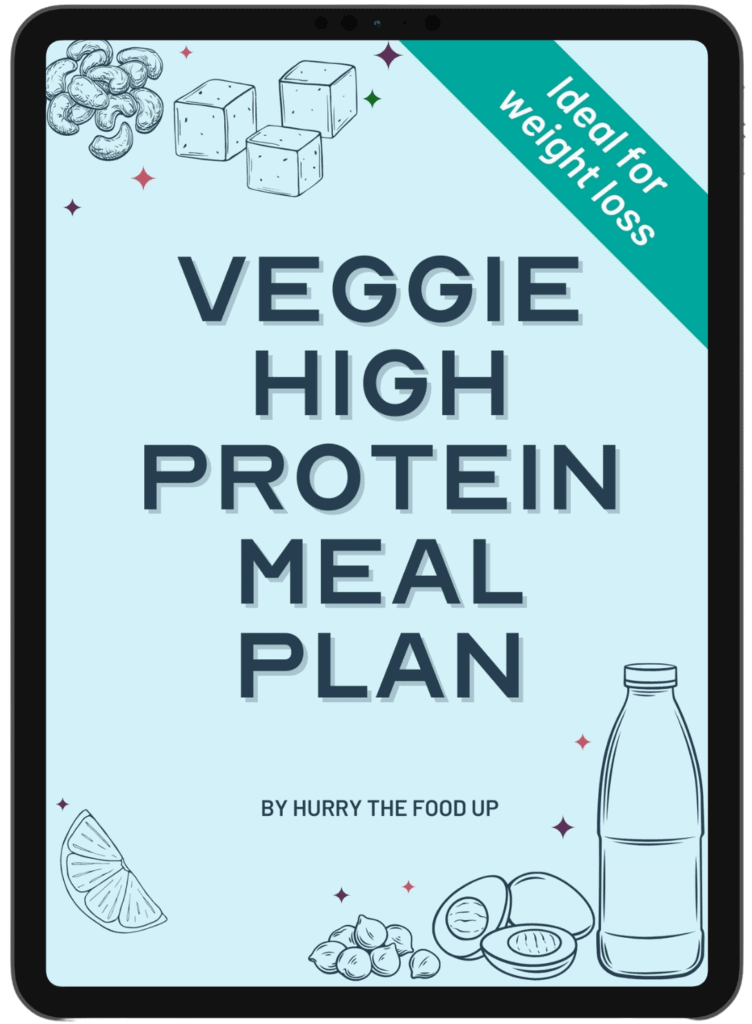















Hi ! We just watched The Game Changers documentary, after our vegan Chiropractor recommended it. However, my Husband & I have never been vegetarians, let alone Vegans, and still like some meat & dairy in our diets. I also need to lose 40-60 lbs, and am currently back to a pre-diabetic status (will have blood checked again in Dec., after a 3 month wait.) I also have high blood pressure and liver enzymes. Would any of your Beginner Vegetarian Meal Plans be safe, and “easy” to follow to get better health results ? I love the Free 7-day Plan, but if I have to continue w/a monthly subscription plan, we probably can’t afford it, being retired and on an ever-shrinking fixed income. But, your 7-day plan would definitely be a great, sensible way to start ! Thank you, Marti Dawson 🙂
Hi Marti, thanks for the comment and sorry for the slow reply here. Yep, looking through what you’ve mentioned the 4 week beginner meal pack should fit you well. The pack and plans are straightforward, and even include a grocery list for you. But if you try it and don’t get on with it you can contact us for a refund! Hope that helps, and good luck P.S. You can always give us an email to let us know how you’re getting on!
great work really helpfull. changed my life for the better.
Happy to help, heer! Glad you’ve found it so useful 🙂
I’ve been transitioning to vegetarian over the last 2 months. Challenges have been finding new recipes that include common ingredients versus having to buy just for the one time and then maybe I end up not liking it. And keeping it quick and simple for packing lunch. I’m happy to try your 7 day plan. I also need to lose 25 lbs.
Hi Lisa! Really happy to hear you’ve found our plan. It sounds like it should be just what you’re looking for. We try to use not too outlandish ingredients for exactly the reason you state. Also, 25lbs is very doable indeed. We build our plans for safe and healthy weight loss – no more than 1-2lbs per week. This means 2 things – it’s much better for your body and health than rapid weight loss, and as consistency is key here, you’re far more likely to stick to it when you feel good and full of energy. If you allow yourself somewhere in the region of 3-6 months you should be spot on to hit your goals healthily. As a bonus, the habits implemented during that time are far more likely to become long-term, too! Good luck, and any questions, please do write again 🙂
Is there a plan for diabetics?
Hi David, I’m afraid it’s not something we have at the moment! Though we have many recipes that may be suitable – please see what you think about: https://hurrythefoodup.com/vegetarian-keto-recipes/ and https://hurrythefoodup.com/18-low-carb-vegetarian-recipes/. I hope they help!
Hi,
I am a female, 5’6 & 160lbs. I want to lose around 10lbs, but also build muscles. Which meal plan should I follow?
Thanks for your time & knowledge!
Hi TJ, I think this plan is already a very good start! It clocks in at around 1500kcal/day. I’d say find a calculator online to estimate your daily caloric intake to lose weight (roughly 500kcal less than you need to maintain). Then adjust this plan accordingly. With most people it should fit roughly. If not, it should be fairly easy to adjust by swapping snacks 🙂
I hope this helps!
Another amazing post. I have downloaded your plan and i am going to try this time.
Great! Enjoy!
I could never understand which foods have what because most websites have false information. I want to sincerely thank you for disclosing the protein, B12 and all other mineral sources. Plus, so many recipes and 7-day plan! Thank you!